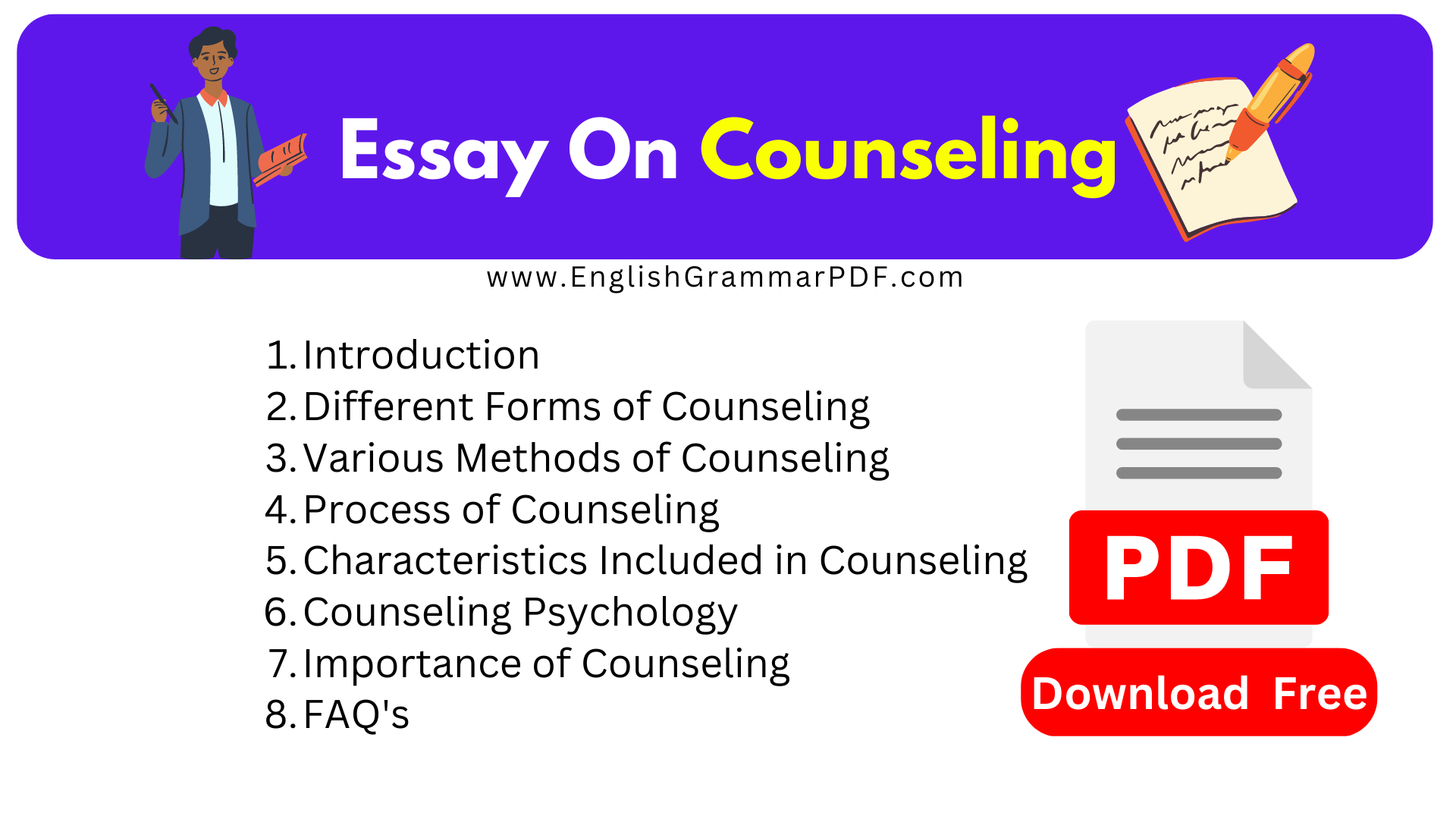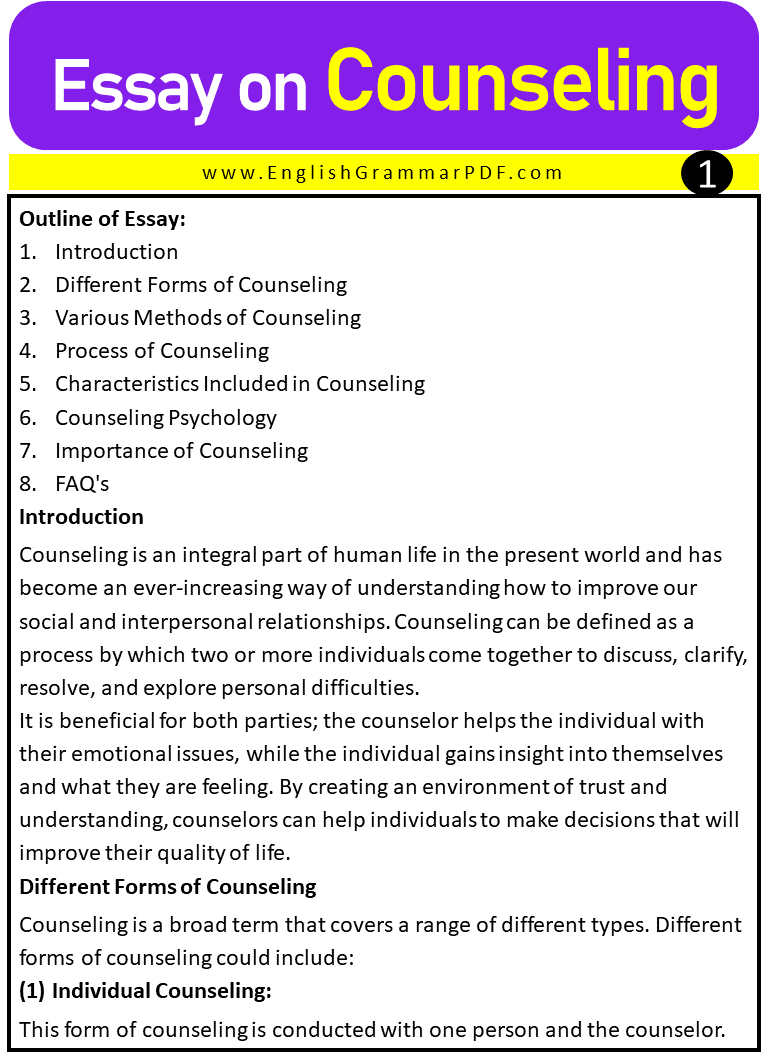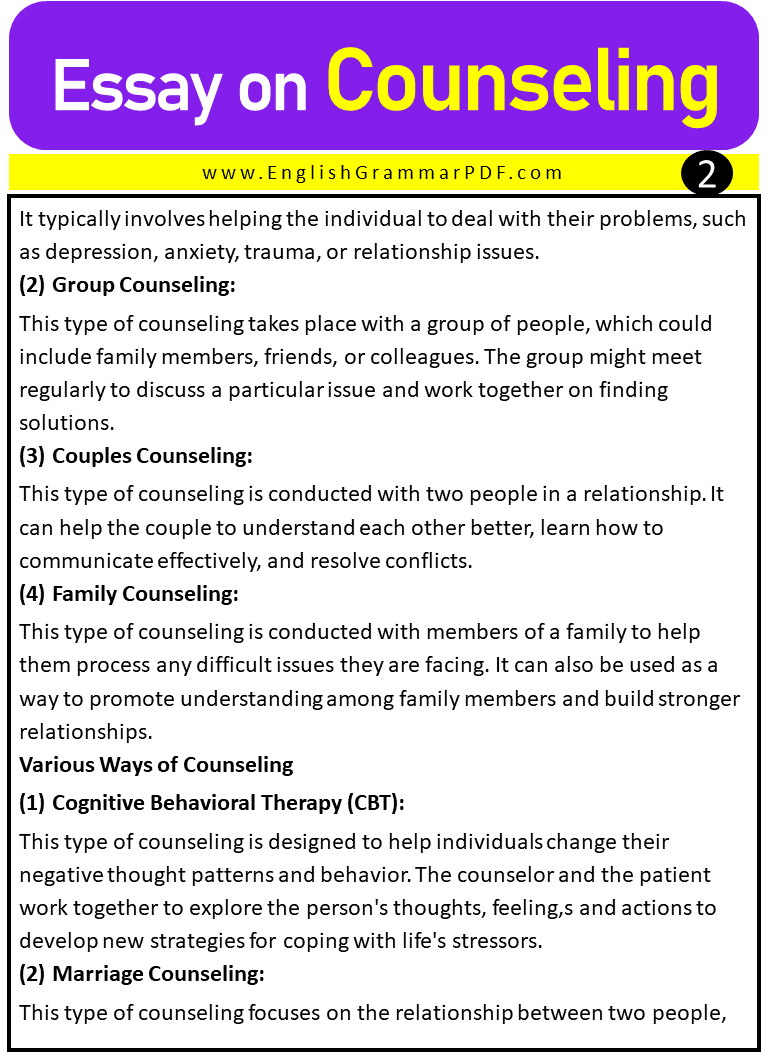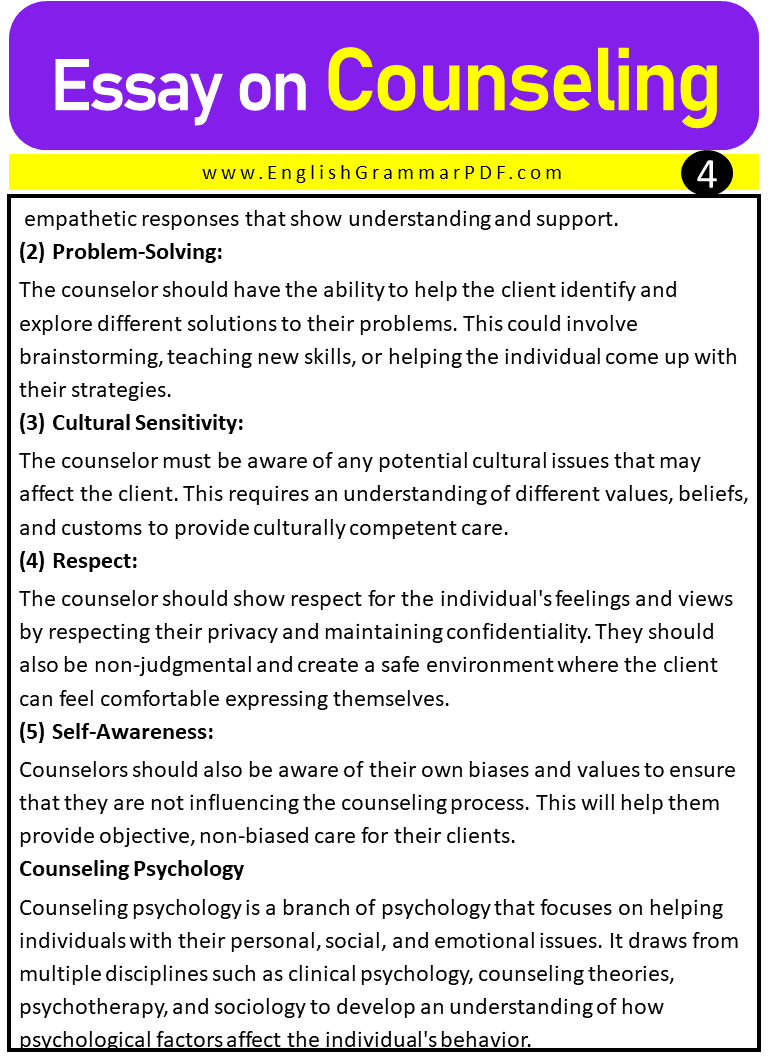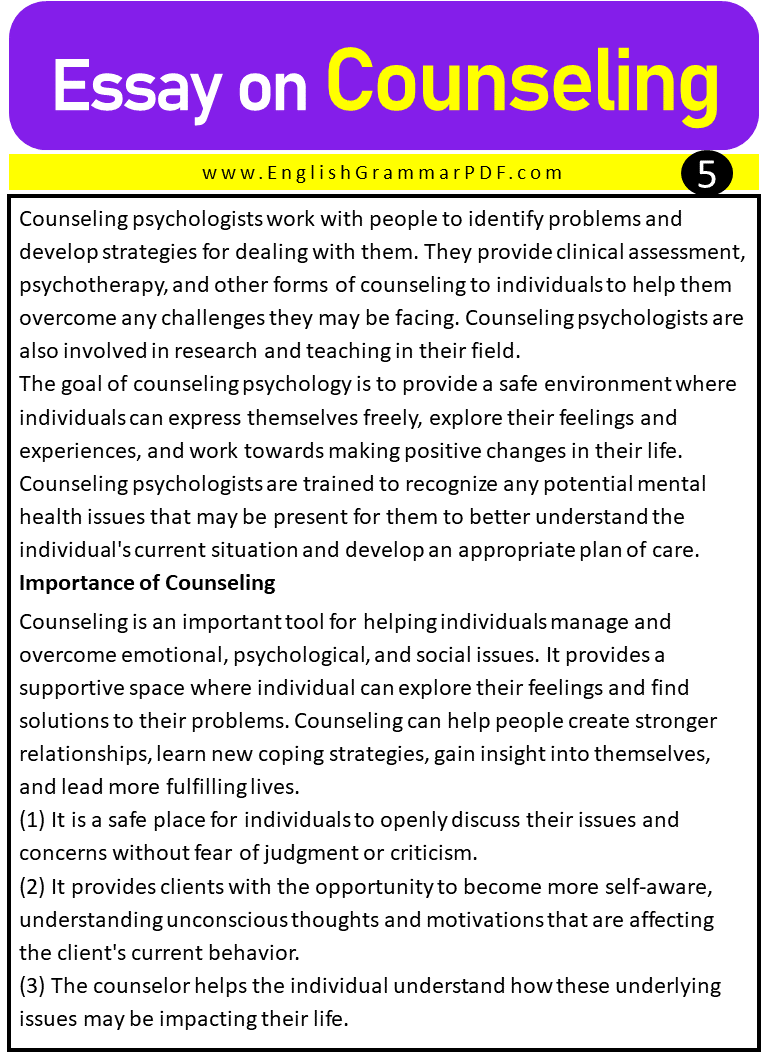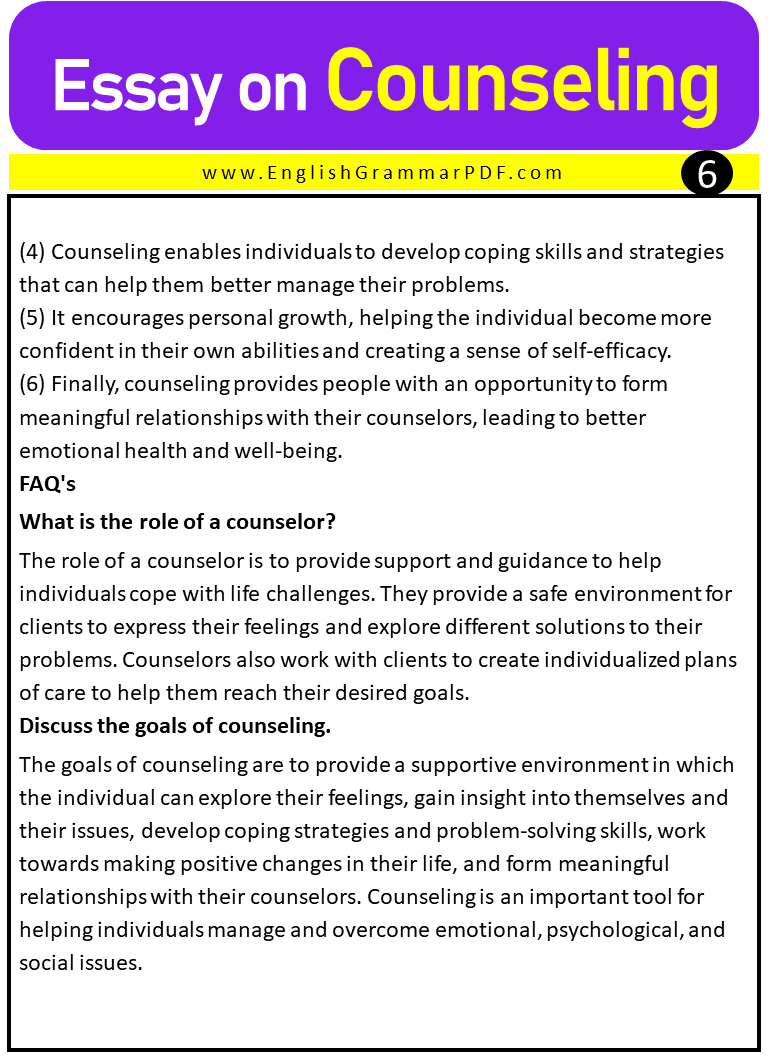Essay On Counseling
Outline of Essay:
- Introduction
- Different Forms of Counseling
- Various Methods of Counseling
- Process of Counseling
- Characteristics Included in Counseling
- Counseling Psychology
- Importance of Counseling
- FAQ’s
Discover More:
Introduction
Counseling is an integral part of human life in the present world and has become an ever-increasing way of understanding how to improve our social and interpersonal relationships. Counseling can be defined as a process by which two or more individuals come together to discuss, clarify, resolve, and explore personal difficulties.
It is beneficial for both parties; the counselor helps the individual with their emotional issues, while the individual gains insight into themselves and what they are feeling. By creating an environment of trust and understanding, counselors can help individuals to make decisions that will improve their quality of life.
Different Forms of Counseling
Counseling is a broad term that covers a range of different types. Different forms of counseling could include:
(1) Individual Counseling:
This form of counseling is conducted with one person and the counselor. It typically involves helping the individual to deal with their problems, such as depression, anxiety, trauma, or relationship issues.
(2) Group Counseling:
This type of counseling takes place with a group of people, which could include family members, friends, or colleagues. The group might meet regularly to discuss a particular issue and work together on finding solutions.
(3) Couples Counseling:
This type of counseling is conducted with two people in a relationship. It can help the couple to understand each other better, learn how to communicate effectively, and resolve conflicts.
(4) Family Counseling:
This type of counseling is conducted with members of a family to help them process any difficult issues they are facing. It can also be used as a way to promote understanding among family members and build stronger relationships.
Various Ways of Counseling
(1) Cognitive Behavioral Therapy (CBT):
This type of counseling is designed to help individuals change their negative thought patterns and behavior. The counselor and the patient work together to explore the person’s thoughts, feeling,s and actions to develop new strategies for coping with life’s stressors.
(2) Marriage Counseling:
This type of counseling focuses on the relationship between two people, usually with a married couple. The goal of marriage counseling is to strengthen communication and problem-solving skills to create a healthier, more satisfying relationship.
(3) Psychodynamic Therapy:
This type of counseling focuses on uncovering unconscious thoughts and motivations that are affecting the client’s current behavior. The therapist helps the patient become increasingly aware of their inner workings and how it affects their outward behavior.
Process of Counseling
The process of counseling begins with the first meeting between a counselor and a client. During this initial session, the two individuals discuss the individual concerns, issues, or problems they are facing.
The counselor listens attentively and asks questions to gain more insight into what is troubling the client. The counselor then begins to work with the individual to develop a treatment plan that best suits their needs.
This could involve talking about the individual’s feelings, exploring different solutions or strategies, and providing guidance and support throughout the process. As counseling progresses, the client is encouraged to take responsibility for their growth and choices.
Characteristics Included in Counseling
Counseling involves many different characteristics and skills. These include:
(1) Active Listening:
The counselor must be able to listen carefully and deeply to the client to truly understand what they are saying. They should also be able to provide empathetic responses that show understanding and support.
(2) Problem-Solving:
The counselor should have the ability to help the client identify and explore different solutions to their problems. This could involve brainstorming, teaching new skills, or helping the individual come up with their strategies.
(3) Cultural Sensitivity:
The counselor must be aware of any potential cultural issues that may affect the client. This requires an understanding of different values, beliefs, and customs to provide culturally competent care.
(4) Respect:
The counselor should show respect for the individual’s feelings and views by respecting their privacy and maintaining confidentiality. They should also be non-judgmental and create a safe environment where the client can feel comfortable expressing themselves.
(5) Self-Awareness:
Counselors should also be aware of their own biases and values to ensure that they are not influencing the counseling process. This will help them provide objective, non-biased care for their clients.
Counseling Psychology
Counseling psychology is a branch of psychology that focuses on helping individuals with their personal, social, and emotional issues. It draws from multiple disciplines such as clinical psychology, counseling theories, psychotherapy, and sociology to develop an understanding of how psychological factors affect the individual’s behavior.
Counseling psychologists work with people to identify problems and develop strategies for dealing with them. They provide clinical assessment, psychotherapy, and other forms of counseling to individuals to help them overcome any challenges they may be facing. Counseling psychologists are also involved in research and teaching in their field.
The goal of counseling psychology is to provide a safe environment where individuals can express themselves freely, explore their feelings and experiences, and work towards making positive changes in their life. Counseling psychologists are trained to recognize any potential mental health issues that may be present for them to better understand the individual’s current situation and develop an appropriate plan of care.
Importance of Counseling
Counseling is an important tool for helping individuals manage and overcome emotional, psychological, and social issues. It provides a supportive space where an individual can explore their feelings and find solutions to their problems. Counseling can help people create stronger relationships, learn new coping strategies, gain insight into themselves, and lead more fulfilling lives.
(1) It is a safe place for individuals to openly discuss their issues and concerns without fear of judgment or criticism.
(2) It provides clients with the opportunity to become more self-aware, understanding unconscious thoughts and motivations that are affecting the client’s current behavior.
(3) The counselor helps the individual understand how these underlying issues may be impacting their life.
(4) Counseling enables individuals to develop coping skills and strategies that can help them better manage their problems.
(5) It encourages personal growth, helping the individual become more confident in their own abilities and creating a sense of self-efficacy.
(6) Finally, counseling provides people with an opportunity to form meaningful relationships with their counselors, leading to better emotional health and well-being.
FAQ’s
What is the role of a counselor?
The role of a counselor is to provide support and guidance to help individuals cope with life challenges. They provide a safe environment for clients to express their feelings and explore different solutions to their problems. Counselors also work with clients to create individualized plans of care to help them reach their desired goals.
Discuss the goals of counseling.
The goals of counseling are to provide a supportive environment in which the individual can explore their feelings, gain insight into themselves and their issues, develop coping strategies and problem-solving skills, work towards making positive changes in their life, and form meaningful relationships with their counselors. Counseling is an important tool for helping individuals manage and overcome emotional, psychological, and social issues.
What are the 3 types of counseling?
The three main types of counseling are psychotherapy, cognitive-behavioral therapy (CBT), and person-centered therapy. Each type of counseling has its unique approach to helping individuals create positive behavioral changes.
What is the importance of counseling?
The importance of counseling is that it provides individuals with a safe and supportive environment to express their feelings, explore solutions to their challenges, gain insight into themselves, and develop stronger relationships. Counseling helps people create healthier lives by providing them with the tools they need to overcome any obstacles they are facing.
What is the most important stage of counseling and why?
The most important stage of counseling is the assessment stage. This is when the counselor gathers information from the client and assesses their individual needs to develop an appropriate plan of care. The assessment stage plays a critical role as it allows the counselor to gain a better understanding of the client’s current situation and provide them with tailored advice and support.
Download PDF of Essay On Counseling
